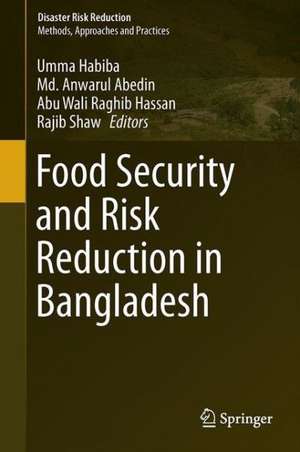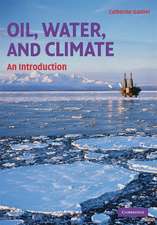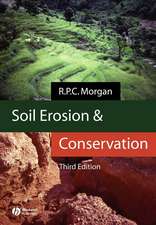Food Security and Risk Reduction in Bangladesh: Disaster Risk Reduction
Editat de Umma Habiba, Md. Anwarul Abedin, Abu Wali Raghib Hassan, Rajib Shawen Limba Engleză Hardback – 31 mar 2015
Bangladesh is situated in a climatically vulnerable position and is impacted frequently by such climatic hazards as floods, cyclones, droughts, and salinity intrusion. Due to global atmospheric changes, abrupt shifts in climatic conditions severely affect Bangladesh’s agriculture. Although Bangladesh has made significant progress in increasing domestic production of food grain, if the production of major cereals is hampered due to climate change, food security will be in jeopardy. Most estimates show that a huge amount of additional food grain will be required to feed the growing population of the country. Ensuring food security for all is the overarching goal of Bangladesh’s national food policy. Therefore, ensuring food security in the future requires a great deal of additional effort in yield improvement, with limited scope for expanding the area under cultivation.
The primary target readers for this book are students and researchers in the fields of environment, disaster risk reduction, and climate change studies. The book will provide them with a good idea of the current trend of research in the field and will furnish basic knowledge on this important topic. Another target group comprises practitioners and policy makers, who will be able to apply collective knowledge to policy and decision making.
| Toate formatele și edițiile | Preț | Express |
|---|---|---|
| Paperback (1) | 559.99 lei 38-44 zile | |
| Springer – 9 oct 2016 | 559.99 lei 38-44 zile | |
| Hardback (1) | 646.30 lei 43-57 zile | |
| Springer – 31 mar 2015 | 646.30 lei 43-57 zile |
Din seria Disaster Risk Reduction
- 18%
 Preț: 796.61 lei
Preț: 796.61 lei -
 Preț: 394.30 lei
Preț: 394.30 lei - 18%
 Preț: 790.46 lei
Preț: 790.46 lei - 15%
 Preț: 654.12 lei
Preț: 654.12 lei - 18%
 Preț: 967.08 lei
Preț: 967.08 lei - 24%
 Preț: 640.27 lei
Preț: 640.27 lei - 18%
 Preț: 1009.16 lei
Preț: 1009.16 lei - 18%
 Preț: 890.54 lei
Preț: 890.54 lei - 18%
 Preț: 942.94 lei
Preț: 942.94 lei - 18%
 Preț: 782.24 lei
Preț: 782.24 lei - 18%
 Preț: 898.75 lei
Preț: 898.75 lei - 18%
 Preț: 956.33 lei
Preț: 956.33 lei - 18%
 Preț: 947.50 lei
Preț: 947.50 lei - 15%
 Preț: 643.34 lei
Preț: 643.34 lei - 24%
 Preț: 921.07 lei
Preț: 921.07 lei - 18%
 Preț: 951.91 lei
Preț: 951.91 lei - 18%
 Preț: 894.97 lei
Preț: 894.97 lei - 15%
 Preț: 641.85 lei
Preț: 641.85 lei - 24%
 Preț: 639.86 lei
Preț: 639.86 lei - 18%
 Preț: 790.14 lei
Preț: 790.14 lei - 18%
 Preț: 729.18 lei
Preț: 729.18 lei - 18%
 Preț: 784.13 lei
Preț: 784.13 lei - 18%
 Preț: 783.50 lei
Preț: 783.50 lei - 18%
 Preț: 784.48 lei
Preț: 784.48 lei - 24%
 Preț: 698.99 lei
Preț: 698.99 lei - 15%
 Preț: 642.18 lei
Preț: 642.18 lei - 15%
 Preț: 651.51 lei
Preț: 651.51 lei - 18%
 Preț: 943.57 lei
Preț: 943.57 lei - 15%
 Preț: 649.54 lei
Preț: 649.54 lei - 24%
 Preț: 690.45 lei
Preț: 690.45 lei - 24%
 Preț: 899.52 lei
Preț: 899.52 lei - 18%
 Preț: 962.27 lei
Preț: 962.27 lei - 15%
 Preț: 652.17 lei
Preț: 652.17 lei - 15%
 Preț: 646.75 lei
Preț: 646.75 lei - 20%
 Preț: 587.28 lei
Preț: 587.28 lei - 15%
 Preț: 647.40 lei
Preț: 647.40 lei - 18%
 Preț: 957.75 lei
Preț: 957.75 lei
Preț: 646.30 lei
Preț vechi: 760.35 lei
-15% Nou
Puncte Express: 969
Preț estimativ în valută:
123.67€ • 129.47$ • 102.33£
123.67€ • 129.47$ • 102.33£
Carte tipărită la comandă
Livrare economică 07-21 aprilie
Preluare comenzi: 021 569.72.76
Specificații
ISBN-13: 9784431554103
ISBN-10: 4431554106
Pagini: 250
Ilustrații: XII, 273 p. 62 illus., 60 illus. in color.
Dimensiuni: 155 x 235 x 17 mm
Greutate: 0.58 kg
Ediția:2015
Editura: Springer
Colecția Springer
Seria Disaster Risk Reduction
Locul publicării:Tokyo, Japan
ISBN-10: 4431554106
Pagini: 250
Ilustrații: XII, 273 p. 62 illus., 60 illus. in color.
Dimensiuni: 155 x 235 x 17 mm
Greutate: 0.58 kg
Ediția:2015
Editura: Springer
Colecția Springer
Seria Disaster Risk Reduction
Locul publicării:Tokyo, Japan
Public țintă
ResearchCuprins
Introduction and overview of food security and risk reduction issues.- Anthropogenic causes: Population pressure, demographic changes, urbanization and its implication on food security.- Natural causes: Climate change implications, resource management and food security.- Social issues: Occupation change and food security in Bangladesh.- Livelihood security: Implications from agriculture sectors.- Livelihood security: Implications from aquaculture sectors.- Regional analysis, import-export and related issues on food security.- Policy support and institutional dimensions of food security.- People and community actions on food security.- Climate change and food security in vulnerable coastal zones of Bangladesh.- Soil Health and food security: Perspective from southwestern coastal region of Bangladesh.- Role of Water Resource Management in Ensuring Food Security.- Climate Change, Flood, Food Security and Human Health: Cross-cutting Issues in Bangladesh.- Future approaches of food security, sustainable development, environment and resource management and disaster risk reduction.
Textul de pe ultima copertă
This book draws examples from food security issues in Bangladesh. The book is structured around those issues and underlying causes of food security, the implications from different sectors, policy analysis, and the role and actions of various stakeholders from different sectors to ensure food security.
Bangladesh is situated in a climatically vulnerable position and is impacted frequently by such climatic hazards as floods, cyclones, droughts, and salinity intrusion. Due to global atmospheric changes, abrupt shifts in climatic conditions severely affect Bangladesh’s agriculture. Although Bangladesh has made significant progress in increasing domestic production of food grain, if the production of major cereals is hampered due to climate change, food security will be in jeopardy. Most estimates show that a huge amount of additional food grain will be required to feed the growing population of the country. Ensuring food security for all is the overarching goal of Bangladesh’s national food policy. Therefore, ensuring food security in the future requires a great deal of additional effort in yield improvement, with limited scope for expanding the area under cultivation.
The primary target readers for this book are students and researchers in the fields of environment, disaster risk reduction, and climate change studies. The book will provide them with a good idea of the current trend of research in the field and will furnish basic knowledge on this important topic. Another target group comprises practitioners and policymakers, who will be able to apply collective knowledge to policy and decision making.
Bangladesh is situated in a climatically vulnerable position and is impacted frequently by such climatic hazards as floods, cyclones, droughts, and salinity intrusion. Due to global atmospheric changes, abrupt shifts in climatic conditions severely affect Bangladesh’s agriculture. Although Bangladesh has made significant progress in increasing domestic production of food grain, if the production of major cereals is hampered due to climate change, food security will be in jeopardy. Most estimates show that a huge amount of additional food grain will be required to feed the growing population of the country. Ensuring food security for all is the overarching goal of Bangladesh’s national food policy. Therefore, ensuring food security in the future requires a great deal of additional effort in yield improvement, with limited scope for expanding the area under cultivation.
The primary target readers for this book are students and researchers in the fields of environment, disaster risk reduction, and climate change studies. The book will provide them with a good idea of the current trend of research in the field and will furnish basic knowledge on this important topic. Another target group comprises practitioners and policymakers, who will be able to apply collective knowledge to policy and decision making.
Caracteristici
Discusses background information for researchers, academia and students Explains scenarios of food security in Bangladesh Provides initiatives for policy implementation












